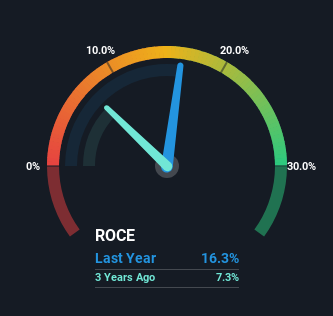The Returns On Capital At Navneet Education (NSE:NAVNETEDUL) Don't Inspire Confidence
Finding a business that has the potential to grow substantially is not easy, but it is possible if we look at a few key financial metrics. Firstly, we'll want to see a proven return on capital employed (ROCE) that is increasing, and secondly, an expanding base of capital employed. Basically this means that a company has profitable initiatives that it can continue to reinvest in, which is a trait of a compounding machine. Having said that, from a first glance at Navneet Education (NSE:NAVNETEDUL) we aren't jumping out of our chairs at how returns are trending, but let's have a deeper look.
What Is Return On Capital Employed (ROCE)?
Just to clarify if you're unsure, ROCE is a metric for evaluating how much pre-tax income (in percentage terms) a company earns on the capital invested in its business. The formula for this calculation on Navneet Education is:
Return on Capital Employed = Earnings Before Interest and Tax (EBIT) ÷ (Total Assets - Current Liabilities)
0.16 = ₹2.2b ÷ (₹16b - ₹2.3b) (Based on the trailing twelve months to September 2023).
So, Navneet Education has an ROCE of 16%. In absolute terms, that's a satisfactory return, but compared to the Media industry average of 9.3% it's much better.
Check out our latest analysis for Navneet Education

In the above chart we have measured Navneet Education's prior ROCE against its prior performance, but the future is arguably more important. If you're interested, you can view the analysts predictions in our free report on analyst forecasts for the company.
What Does the ROCE Trend For Navneet Education Tell Us?
In terms of Navneet Education's historical ROCE movements, the trend isn't fantastic. Over the last five years, returns on capital have decreased to 16% from 28% five years ago. On the other hand, the company has been employing more capital without a corresponding improvement in sales in the last year, which could suggest these investments are longer term plays. It may take some time before the company starts to see any change in earnings from these investments.
On a related note, Navneet Education has decreased its current liabilities to 15% of total assets. That could partly explain why the ROCE has dropped. What's more, this can reduce some aspects of risk to the business because now the company's suppliers or short-term creditors are funding less of its operations. Since the business is basically funding more of its operations with it's own money, you could argue this has made the business less efficient at generating ROCE.
Our Take On Navneet Education's ROCE
Bringing it all together, while we're somewhat encouraged by Navneet Education's reinvestment in its own business, we're aware that returns are shrinking. And investors may be recognizing these trends since the stock has only returned a total of 35% to shareholders over the last five years. Therefore, if you're looking for a multi-bagger, we'd propose looking at other options.
One more thing, we've spotted 2 warning signs facing Navneet Education that you might find interesting.
While Navneet Education may not currently earn the highest returns, we've compiled a list of companies that currently earn more than 25% return on equity. Check out this free list here.
Valuation is complex, but we're here to simplify it.
Discover if Navneet Education might be undervalued or overvalued with our detailed analysis, featuring fair value estimates, potential risks, dividends, insider trades, and its financial condition.
Access Free AnalysisHave feedback on this article? Concerned about the content? Get in touch with us directly. Alternatively, email editorial-team (at) simplywallst.com.
This article by Simply Wall St is general in nature. We provide commentary based on historical data and analyst forecasts only using an unbiased methodology and our articles are not intended to be financial advice. It does not constitute a recommendation to buy or sell any stock, and does not take account of your objectives, or your financial situation. We aim to bring you long-term focused analysis driven by fundamental data. Note that our analysis may not factor in the latest price-sensitive company announcements or qualitative material. Simply Wall St has no position in any stocks mentioned.
About NSEI:NAVNETEDUL
Navneet Education
Navneet Education Limited, together with its subsidiaries, publishes state board books in India, North and Central America, Africa, Europe, and internationally.
Flawless balance sheet established dividend payer.
Similar Companies
Market Insights
Community Narratives



